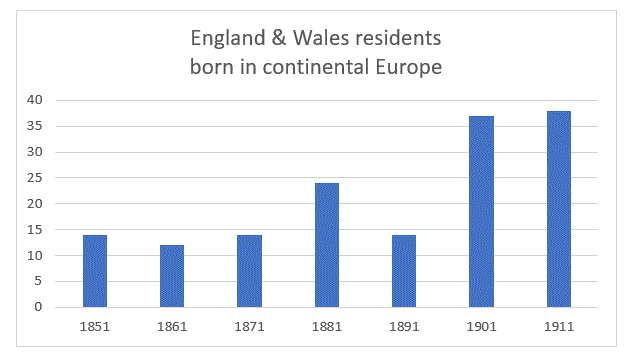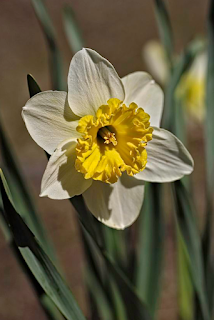Leaving Europe
Since recent news has been dominated by the departure of the UK from the European Union on 31st January 2020, my thoughts this week turn to some CLOSEs (and variants) in my one-name study born in continental Europe who left their homeland and appear in England & Wales census records.
Census data
The following table shows the number of people in each census 1851 – 1911 giving a birthplace in continental Europe. 1841 is not included, since county of birth was not named, although of the 8 people named CLOSE (or variants KLOS, KLOESS, KLOSZ, CLOS, CLOOS …) whose birthplace was ‘F’, six have been identified as European-born from later census entries.
So where exactly were these people born? The following graphic gives an overview of their birthplaces as indicated in the 1851 to 1911 census records.
Some of the foreign-born CLOSEs were British subjects from families of merchants or diplomatic staff. The graphic makes it very clear that the vast majority of foreign-born individuals in every census originated in Germany – a term which is used here as a general designation for historical states such as Hamburg or Bavaria which are geographically aligned with modern-day Germany. I will therefore focus now on some CLOSEs of German origin, originally named KLOSZ, who were evidently living in London at least as early as 1820.
The KLOSZ bakers in London
In 1851, the first census to indicate birthplaces and relationships, we find four heads of family named KLOS or KLOSZ, all bakers:
- John KLOS (b Germany abt 1783) at 55 Great Marlborough Street, Westminster and his wife Susanna KLOS, 74 (b Titchmarsh, Northamptonshire abt 1776). The couple were living in the same street in 1841. John married Susanna MARTIN at St Dunstan and All Saints, Stepney on 28 December 1820, where both John and Susanna are designated “of this parish and hamlet of MEOT (= Mile End Old Town). John is a widower, and although official records spell his name KLOS, the signature on his marriage record looks like KLOSZ. Both died in the 1850s.
- Anthony (otherwise Frederick Anthony) KLOSZ (b Germany abt 1809) living at 47 Cambridge Street, Paddington with his wife Ann and eight children, the eldest of which, Frederick, 14, is also listed as a baker. They had married on 1 November 1835 at St Anne, Soho. They continued to live at the same address until at least 1871.
- John H (John Henry or Johann Heinrich) KLOSZ (b Prussia abt 1811) living at 3 Moor Street, Westminster with his wife Sarah and five children. John had married Margaret MORRIS on 6 Dec 1835 at St Anne, Soho, but Margaret died in 1841, just under two years after the birth of their third child. John remarried on 6 Nov 1843, as announced in Berrow’s Worcester Journal of 16 Nov 1843: "Nov 6, at St John's Hampstead, by the Rev. R Collins, Mr J H Klosz, of London, to Sarah, eldest daughter of Mr Charles Allcock, upholsterer etc, Mill Street, Kidderminster." The family, to which ten more children were added, remained at the same address until at least 1881, John having died in 1879.
- Jacob (or Henry Jacob) KLOSZ (b Prussia abt 1822) was at 3 Moor Street with John Henry in 1841, but after his marriage to Mary Ann ALLCOCK (sister of John Henry’s wife) in 1845 they were living at 63 Earl Street, Marylebone in 1851. Nine children were born to them between 1846 and 1858. In 1861 and 1871 the family was installed at 55 Great Marlborough Street, formerly occupied by John and Susanna (see 1 above).
Digging deeper
It's good to delve beyond the bare facts of census records or births, marriages and deaths to learn something of the circumstances in which these people lived. The 19th Century British Newspaper Archive (available as a subscription service, but also accessible free from public libraries, some of which offer library members online access from home free of charge) is a real treasure-store, and the KLOSZ family feature in many papers. Evidently the bakery had a sideline in discreet advertising: a large number of ads for staff (groom, housemaid etc) appear in The Times between 1829 and 1856 using Mr KLOS (sometimes KLOSZ), baker, 55 Great Marlborough Street, as a contact address.
There is also evidence that the bakery business had a high-class clientele: www.oldbaileyonline.org records a trial on 29 November 1841 of one of John and Sarah’s employees, who was found not guilty of embezzling 1s 2½d, in which it was stated he regularly delivered bread to the butler of the Dowager Countess of Essex. What is more, Sarah’s 1853 death announcement in The Standard describes her as “the beloved wife of Mr J Klos, purveyor to her Majesty.”
There is also evidence that the bakery business had a high-class clientele: www.oldbaileyonline.org records a trial on 29 November 1841 of one of John and Sarah’s employees, who was found not guilty of embezzling 1s 2½d, in which it was stated he regularly delivered bread to the butler of the Dowager Countess of Essex. What is more, Sarah’s 1853 death announcement in The Standard describes her as “the beloved wife of Mr J Klos, purveyor to her Majesty.”
Relationships
One of the aims of a one-name study is to identify relationships and reconstruct family trees. These four heads of families certainly look as if they are all related – but if so, what is the relationship, and what evidence is available? John b 1783 is old enough to be the father of the other three, and since Jacob was living in John’s former home in 1861 and 1871, that certainly points to a relationship between the two. John was a widower when he married Susanna MARTIN in 1920, so Anthony and John Henry could be sons from his first marriage, although no direct evidence has been found.
John Henry’s 1879 probate record gives us a clue: one of the executors is “Henry Jacob KLOSZ of Frithville Gardens, Shepherd’s Bush, Middlesex, grocer, the brother.” This is evidently Jacob, who was living at 30 Frithville Gardens in 1881 and died there in 1890.
John Henry’s 1879 probate record gives us a clue: one of the executors is “Henry Jacob KLOSZ of Frithville Gardens, Shepherd’s Bush, Middlesex, grocer, the brother.” This is evidently Jacob, who was living at 30 Frithville Gardens in 1881 and died there in 1890.
www.oldbaileyonline.org suggests that John KLOSZ had a brother, since an 1827 trial of Richard MORRISSEY, 22, for stealing two loaves of bread worth 18d from John KLOS includes evidence from a John Peter KLOSS saying “I am a nephew of John Klos, a baker, of Great Marlborough-street. I was out with his bread on the 1st of February …” Neither the brother nor John Peter have been found in census records. There is, however, an 1830 Land Tax record of a John Peter KLOS at 40 Bear Street, St Anne Westminster, and an 1837 advertisement in the Morning Post referring enquiries to “Mr KLOSZ, 7 Bear St, Leicester Square.”
Who was this KLOSZ?
One wonders whether the missing brother of John, and father of John Peter, could have been the evidently far less successful George Anthony KLOSZ who was also briefly in the bakery business – another person who hasn’t yet been identified on census records, maybe because he was always on the move. Could that have been to avoid his creditors? The sad announcement in The London Gazette (thegazette.co.uk) of 5 Sep 1843 lists insolvent debtors, including the following:
“George Anthony Klosz (otherwise George Anthony Klos, commonly called or known by the name of George Klos, sued and committed as Anthony Klosz), formerly of No. 29, Church-street, Soho, Middlesex, out of business, next of No. 16, Edward-street Hampstead-road, Middlesex, Bread and Biscuit Baker, then of Frankfort, Germany, next of Mary-street, Hampstead-road aforesaid, out of business, next of William-street, Kennington, Surrey, out of business, next of Bowling-green-mews, Bowling-green-street, Kennington, Cab Proprietor, next of No. 56 Union-street, borough of Southwark, Surrey, Baker, next of Allen-street, Hercules-buildings, Lambeth, next of No.3, St Mark’s-road, Kennington, both in Surrey, out of business, next of Gifford-street, Hoxton, Middlesex, out of business, next of No. 56, Vauxhall-street, Lambeth, Surrey, Baker, next of No. 86, Wardour-street, Soho, Middlesex, out of business, and late of No.58, Belvidere-place, Southwark-bridge-road, Surrey, out of business.”
One of those addresses – 16 Edward Street, Hampstead – was used in a press advertisement” c/o Mr Klos, baker” on 13 March 1839.
Why KLOSZ?
Hubert was the first of several KLOSZ grandchildren who chose to assume an English-looking name by deed poll at a time when the German heritage the family had previously remembered with pride had suddenly become an encumbrance. I suspect when the 1921 UK census is published, very few, if any, of this family's 50 or so descendants who would have been alive in 1921 will be found to still have the surname KLOSZ.






Comments
Post a Comment